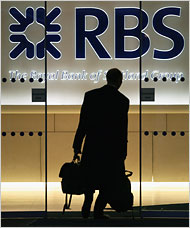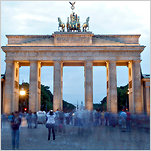LONDON — When Treasury Secretary Timothy F. Geithner arrives in Rome for the first official meeting with his Group of 7 counterparts, he will be a bit of an outlier.

British officials are pushing the Royal Bank of Scotland to pare bonuses and increase lending to homeowners and businesses.
Ireland injected 7 billion euros into its two largest banks Wednesday. In return, it gained the right to appoint four directors, limit executive pay, set lending parameters, require the suspension of home foreclosures, as well as an option to buy a 25 percent equity stake at fire sale prices some time in the future. The government already owns 75 percent of Anglo Irish bank.
In Britain, four of the country’s most troubled financial institutions — two of them were officially nationalized — are already under the de facto control of a newly formed government holding company.
Officials are pushing Lloyds Bank and the Royal Bank of Scotland, among others, to pare bonuses and increase lending to British homeowners and businesses.
Both countries’ actions conform to a growing sense in Europe that the best way to revive banks is to put them on the tightest possible leash. But in an interview in advance of the Friday and Saturday G-7 meetings, a senior Treasury official reiterated that the Obama administration is committed to the proposition that banks must remain in private hands.
“We are not seeking control of financial institutions,” he said. “We are seeking to restructure them.”
Other countries are confronting similar challenges to the United States in different ways.
To be sure, government control of banks in Britain and Ireland are more a result of the desperate times for financial institutions in those countries than bold insight on the part of policy makers. But with this mix of investment and influence, these governments are, however reluctantly, overcoming the bugaboo of nationalization even as they steer clear of the term and its negative associations.
“The N word is a difficult word,” said Richard Portes, an economist at London Business School. “But you need to exercise control in order to get bad assets off the books. The question is, both in the U.K. and the U.S.: What degree of control?”
The market capitalization of the top American banks is collectively below $500 billion, and the International Monetary Fund is estimating that financial write-downs will rise to $2.2 trillion. As a result, a number of analysts say, the Obama administration will be forced to concede that even with recent capital injections, some large banks may become insolvent.
With the full force of the international spotlight focused on Mr. Geithner this weekend, he is facing increased pressure not only to add meat to the skeletal outline of his bank plan, but to demonstrate to a skittish global economy that the Obama administration is ready to take charge.
“There is a vacuum to be filled,” said Morris Goldstein, a policy analyst at the Peterson Institute for International Economics in Washington. “The United States, as the largest global player, needs to lead the show.”
The Irish plan, the most recent policy salvo from a government that has been under withering pressure to address the sick condition of its banks, may provide some guidance. But it is no panacea, either.
“Injecting the first 7 billion euros is a de facto nationalization,” said Brian Lucey, a finance professor at Trinity College Dublin. “And nationalization of the whole Irish banking system is a strong probability.”
Unlike banks in Europe and the United States, Irish banks were not great originators or holders of securitized mortgage assets. But they lent with abandon to residential and commercial property owners and now face a rising tide of nonperforming loans.
According to the terms of the recapitalization, the Irish government will receive preferential shares paying 8 percent interest and a warrant to take a 25 percent stake in the banks in five years, at today’s low prices. That would allow the Irish taxpayer to profit from any improvement in the bank’s value.
That could be a long wait. Write-downs of Irish banks will be significant. Bank of Ireland, warned on Thursday that it would report a loss for the second half of this year and estimated bad loan charges of 4.5 billion euros through 2011. Allied Irish Banks is expected to write off a similar figure.
Such a figure dwarfs the companies’ respective market valuations — 600 million euros for Bank of Ireland and about 1 billion for Allied Irish, a reflection of the extreme pessimism in the market.
Both banks have equity capital ratios of about 6 percent, in line with other major European banks.
In Britain, the home lenders Northern Rock and Bradford & Bingley are fully nationalized, but the government’s control of R.B.S. and Lloyds is less overt, though its influence, by most accounts, is just as strongly felt.
UK Financial Investments is pushing R.B.S., for example, to be a more aggressive local lender. And as the uproar over bonuses has grown here, the body has worked closely with its hand-picked chief executive, Stephen Hester, to cut back on payouts.
The G-7 meeting will mostly be an opportunity for finance ministers to compare notes on the global crisis and their differing solutions. But for Mr. Geithner, it will also be an opportunity to explain the Obama administration’s plan.
“Coming to the exam unprepared is unacceptable,” said Ed Yardeni, an independent market analyst.












